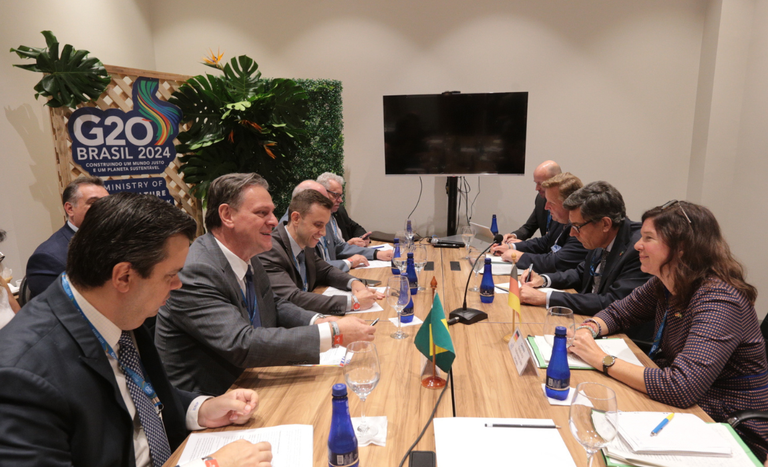Notícias
BILATERAL MEETING
Fávaro highlights that conservation and production are not conflicting goals in bilateral meeting with Germany

Fávaro highlights that conservation and production are not conflicting goals in bilateral meeting with Germany
Continuing the series of bilateral meetings during the G20 Agriculture Working Group (AWC), Brazil’s Minister of Agriculture and Livestock, Carlos Fávaro, met with Ophelia Nick, Germany’s Vice Minister of the Ministry of Food and Agriculture (BMEL), on Wednesday, September 11th. The central topic of discussion was the impact of climate change on agriculture.
Minister Fávaro emphasized that production and conservation can coexist, presenting Brazil's National Program for the Conversion of Degraded Pastures into Sustainable Agricultural and Forestry Production Systems (PNCPD). “Brazil can expand its production without encroaching on forests. Producing and conserving are not opposing goals. That’s why we launched this program for the recovery of degraded pastures,” he stated.
Research conducted by the Brazilian Agricultural Research Corporation (Embrapa) and the Bank of Brazil shows that approximately 40 million hectares of low-productivity pastures in Brazil are highly suitable for agriculture.
Fávaro also pointed out that the goal of the G20 AWC meeting is to showcase Brazil’s potential for sustainable production while emphasizing the urgent need for climate change to remain on the international agenda.
Vice Minister Ophelia Nick agreed, stating that incentives for sustainable production are crucial, especially in light of climate change, and are essential for global food security.
The efforts of President Luiz Inácio Lula da Silva in combating hunger were also highlighted. According to the 2024 edition of the United Nations' Report on the State of Food Security and Nutrition in the World, Brazil has achieved an 85% reduction in severe food insecurity.
During the meeting, initiatives related to the use of bio-inputs in agricultural production were presented, an area in which Brazil is a global leader. Through the National Bio-inputs Program, the Ministry of Agriculture and Livestock promotes, regulates, and registers these inputs in Brazil. Brazilian farmers have increasingly adopted biocontrol practices, such as the use of biofertilizers.
“We are working closely with the Brazilian National Congress to advance the use of bio-inputs in Brazil. We recognize the vast potential of Brazilian agriculture, and these bio-inputs are crucial for fostering sustainable and successful growth,” Fávaro concluded.
Press information
imprensa@agro.gov.br